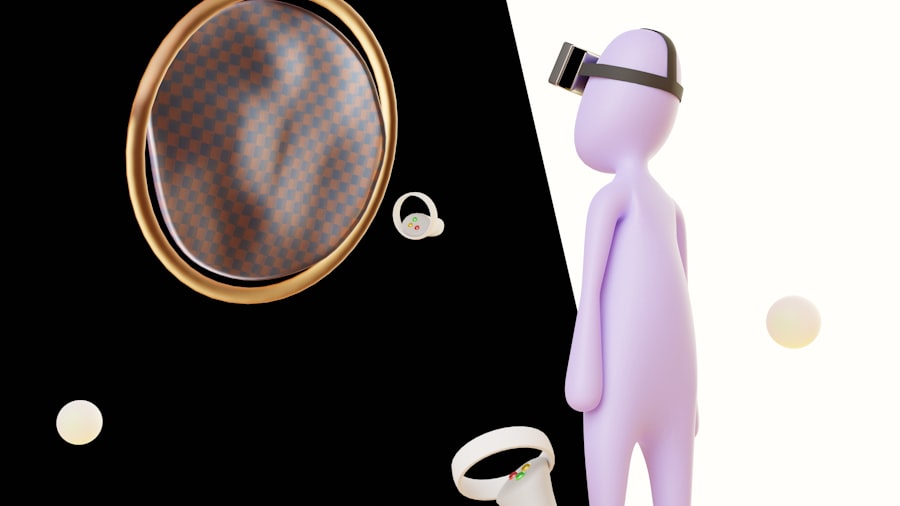Depersonalization-Derealization Disorder (DPDR) can be a perplexing and disorienting experience. You may find yourself feeling detached from your own thoughts, body, or surroundings, as if you are observing your life from a distance. This sensation can be unsettling, leading to feelings of confusion and anxiety.
It’s important to recognize that you are not alone in this experience; many individuals encounter similar feelings, often triggered by stress, trauma, or anxiety. Understanding the nature of DPDR is the first step toward managing its effects on your life. The symptoms of DPDR can manifest in various ways.
You might feel as though you are living in a dream or that the world around you is unreal. This can lead to a sense of isolation, as if you are disconnected from reality and the people around you. The disorder can be transient, lasting only a few moments, or it can persist for longer periods, significantly impacting your daily functioning.
By educating yourself about DPDR, you can begin to demystify these experiences and take proactive steps toward regaining a sense of control over your mental state.
Key Takeaways
- Depersonalization-Derealization Disorder is a mental health condition characterized by feeling detached from oneself and the surrounding environment.
- ADHD medications can potentially worsen symptoms of Depersonalization-Derealization Disorder, so it’s important to find the right balance and dosage with the help of a healthcare provider.
- Managing symptoms of Depersonalization-Derealization Disorder can involve techniques such as grounding exercises, mindfulness, and relaxation techniques.
- Finding the right balance of ADHD medication involves open communication with a healthcare provider, monitoring for side effects, and making adjustments as needed.
- It’s important to communicate openly and honestly with a healthcare provider about symptoms, concerns, and treatment options for Depersonalization-Derealization Disorder and ADHD.
The Impact of ADHD Meds on Depersonalization-Derealization Disorder
If you have been diagnosed with Attention Deficit Hyperactivity Disorder (ADHD) and are taking medication to manage your symptoms, you may wonder how these medications interact with DPDR. Stimulant medications, commonly prescribed for ADHD, can sometimes exacerbate feelings of depersonalization or derealization. You might notice that during periods of increased focus or heightened energy, your sense of self may feel even more distant.
This paradox can be frustrating, as you seek clarity and concentration while grappling with disconnection. On the other hand, some individuals find that their ADHD medications help alleviate symptoms of anxiety and improve overall mood, which can indirectly reduce feelings of depersonalization. It’s essential to monitor how your body responds to these medications and to communicate any changes in your symptoms to your healthcare provider.
Understanding the dual nature of ADHD medications in relation to DPDR can empower you to make informed decisions about your treatment plan.
Tips for Managing Depersonalization-Derealization Disorder Symptoms

Managing the symptoms of DPDR requires a multifaceted approach tailored to your unique experiences. One effective strategy is grounding techniques, which help anchor you in the present moment. You might try focusing on your breathing, feeling the texture of an object in your hand, or engaging your senses by noticing the colors and sounds around you.
These practices can help bridge the gap between your internal experience and the external world, fostering a sense of connection. Another helpful tip is to establish a routine that incorporates self-care activities. Regular exercise, a balanced diet, and adequate sleep can significantly impact your mental health.
You may also want to explore creative outlets such as journaling or art, which can provide an avenue for expressing your feelings and processing your experiences. By actively engaging in self-care and grounding techniques, you can cultivate resilience against the symptoms of DPDR.
Finding the Right Balance of ADHD Medication
| Medication | Effectiveness | Side Effects | Duration |
|---|---|---|---|
| Stimulant Medications | High | Decreased appetite, insomnia | Short-acting (4-6 hours) or long-acting (8-12 hours) |
| Non-stimulant Medications | Moderate | Upset stomach, fatigue | Long-acting (24 hours) |
Finding the right balance of ADHD medication is crucial for managing both ADHD symptoms and any co-occurring conditions like DPDR. You may need to work closely with your healthcare provider to determine the most effective dosage and type of medication for your needs. It’s important to be patient during this process, as it may take time to find the right combination that minimizes side effects while maximizing benefits.
As you navigate this journey, keep a journal to track your symptoms and any changes you notice with different medications or dosages. This record can provide valuable insights for discussions with your healthcare provider and help them tailor your treatment plan more effectively. Remember that achieving balance is a collaborative effort between you and your provider, and open communication is key to finding what works best for you.
Communicating with Your Healthcare Provider
Effective communication with your healthcare provider is essential when managing DPDR alongside ADHD. You should feel empowered to discuss any concerns or changes in your symptoms openly. If you notice that certain medications exacerbate feelings of depersonalization or derealization, it’s crucial to bring this up during your appointments.
Your provider can help adjust your treatment plan based on your feedback. Additionally, don’t hesitate to ask questions about your diagnosis and treatment options. Understanding the rationale behind specific medications or therapies can help alleviate anxiety and foster a sense of control over your mental health journey.
By establishing a trusting relationship with your healthcare provider, you create a supportive environment where you can work together toward achieving optimal mental well-being.
Incorporating Therapy and Support Groups

Incorporating therapy into your treatment plan can be incredibly beneficial for managing DPDR symptoms. Cognitive-behavioral therapy (CBT) is one approach that has shown promise in helping individuals reframe their thoughts and develop coping strategies for dealing with depersonalization experiences. A therapist can guide you through techniques that promote self-awareness and mindfulness, allowing you to confront feelings of disconnection in a safe space.
Support groups can also play a vital role in your journey toward healing. Connecting with others who share similar experiences can provide validation and understanding that may be hard to find elsewhere. You might discover new coping strategies or simply find comfort in knowing that you are not alone in your struggles.
Mindfulness and Relaxation Techniques
Mindfulness practices can be particularly effective in managing symptoms of DPDR. By cultivating present-moment awareness, you can create a buffer against feelings of detachment. Techniques such as meditation, deep breathing exercises, or yoga can help ground you in reality and promote relaxation.
You might start with just a few minutes each day, gradually increasing the duration as you become more comfortable with these practices. Incorporating relaxation techniques into your daily routine can also help reduce overall stress levels, which may contribute to feelings of depersonalization. Consider exploring guided imagery or progressive muscle relaxation as additional tools for calming your mind and body.
By prioritizing mindfulness and relaxation, you create a sanctuary within yourself that fosters stability amidst the challenges posed by DPDR.
Lifestyle Changes to Support Mental Health
Making lifestyle changes can significantly impact your mental health and help manage symptoms of DPDR more effectively. You might consider adopting a balanced diet rich in nutrients that support brain health, such as omega-3 fatty acids found in fish or antioxidants found in fruits and vegetables. Staying hydrated is equally important; dehydration can exacerbate feelings of fatigue and disconnection.
Regular physical activity is another crucial component of maintaining mental well-being. Engaging in exercise releases endorphins, which can elevate mood and reduce anxiety levels. You may find activities like walking, dancing, or swimming enjoyable while also serving as effective outlets for stress relief.
By prioritizing these lifestyle changes, you create a solid foundation for supporting both your mental health and overall well-being.
Identifying Triggers and Avoiding Them
Identifying triggers that exacerbate feelings of depersonalization is an essential step in managing DPDR effectively. You may want to keep a journal where you document instances when symptoms arise, noting any common themes or situations that precede these experiences. This practice can help illuminate patterns that may not be immediately apparent.
Once you’ve identified potential triggers, consider strategies for avoiding or mitigating their impact on your life. For example, if certain stressful situations lead to heightened feelings of detachment, you might develop coping mechanisms or avoidance strategies tailored to those scenarios. By proactively addressing triggers, you empower yourself to navigate daily life with greater confidence and resilience.
Creating a Supportive Environment
Creating a supportive environment at home and work can significantly influence your ability to manage DPDR symptoms effectively. Surround yourself with individuals who understand what you’re going through and who offer encouragement rather than judgment. Open communication with friends and family about your experiences can foster empathy and support.
Additionally, consider making adjustments to your physical environment that promote calmness and stability. This could involve decluttering your space, incorporating soothing colors or scents, or creating designated areas for relaxation and mindfulness practices. By curating an environment that nurtures your mental health, you set the stage for healing and growth.
Seeking Professional Help if Needed
If you find that managing DPDR symptoms becomes overwhelming despite implementing various strategies, seeking professional help is crucial. A mental health professional can provide tailored support and guidance based on your unique circumstances. They may recommend therapy options or adjustments to medication that align with your needs.
Remember that reaching out for help is a sign of strength rather than weakness. You deserve support on this journey toward understanding and managing DPDR effectively. By taking proactive steps to seek professional assistance when needed, you empower yourself to reclaim control over your mental health and well-being.
In conclusion, navigating Depersonalization-Derealization Disorder alongside ADHD requires a comprehensive approach that encompasses understanding the disorder, effective communication with healthcare providers, lifestyle changes, mindfulness practices, and support systems. By actively engaging in these strategies, you can cultivate resilience against the challenges posed by DPDR while fostering a sense of connection to yourself and the world around you.
Depersonalization-derealization disorder (DDD) is a complex mental health condition characterized by persistent feelings of detachment from one’s body or surroundings, often described as feeling like an outside observer of oneself. This disorder can sometimes be exacerbated by certain medications, including those used to treat ADHD. For individuals on ADHD medication, it’s crucial to monitor any changes in perception or emotional state, as these could be indicative of DDD symptoms.
For more detailed information, you can read the article by visiting Unplugged Psych.
LEARN MORE About Unmasking the Mysteries Behind Depersonalization and Derealization
FAQs
What is depersonalization-derealization disorder (DDD)?
Depersonalization-derealization disorder (DDD) is a mental health condition characterized by a persistent or recurring feeling of being detached from one’s body or surroundings. Individuals with DDD may feel as though they are observing themselves from outside their body (depersonalization) or that the world around them is unreal or distorted (derealization).
What are the symptoms of depersonalization-derealization disorder?
Symptoms of depersonalization-derealization disorder may include feeling detached from one’s body or emotions, experiencing a distorted sense of time, feeling as though the world is artificial or dreamlike, and having difficulty connecting with one’s surroundings or loved ones.
What are ADHD medications?
ADHD medications are a class of drugs used to manage symptoms of attention-deficit/hyperactivity disorder (ADHD). These medications can include stimulants such as methylphenidate (e.g., Ritalin) and amphetamine (e.g., Adderall), as well as non-stimulant medications like atomoxetine (Strattera) and guanfacine (Intuniv).
Can ADHD medications affect depersonalization-derealization disorder?
There is limited research on the specific effects of ADHD medications on depersonalization-derealization disorder. Some individuals with DDD may report that stimulant medications exacerbate their symptoms, while others may find relief from certain non-stimulant medications. It is important for individuals with DDD to work closely with a healthcare professional to monitor the effects of ADHD medications on their symptoms.
What should I do if I have depersonalization-derealization disorder and am considering ADHD medication?
If you have depersonalization-derealization disorder and are considering ADHD medication, it is important to consult with a mental health professional who is knowledgeable about both conditions. They can help you weigh the potential benefits and risks of medication and develop a treatment plan that addresses your specific needs. It is also important to communicate openly with your healthcare provider about any changes in your symptoms while taking ADHD medication.




